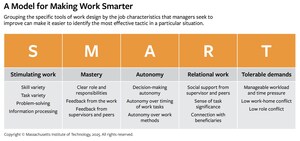CAMBRIDGE, Mass., Oct. 15, 2019 /PRNewswire/ -- After several decades of progress, AI technology is now poised to become a significant source of value for a wide range of businesses. However, companies are not yet realizing the value from AI, according to a major new study released today by MIT Sloan Management Review (MIT SMR) and Boston Consulting Group's BCG GAMMA and BCG Henderson Institute. The study reveals that although executives consider AI to be a critical business opportunity, many leaders are increasingly worried about the strategic risks associated with AI.
The study, as reported in "Winning With AI: Pioneers Combine Strategy, Organizational Behavior, and Technology," is based on a survey of more than 2,500 executives and several in-depth interviews with leading experts. The data reveals:
- Nine out of ten agree that AI represents a business opportunity for their company.
- Seven out of ten companies report minimal or no impact from AI so far. Among the 90% of companies that have made investments in AI, fewer than two out of five report obtaining any business gains from AI in the past three years.
- In 2019, 45% perceived some risk from AI—an increase from 37% in 2017.
"Our study reinforces that AI is an urgent issue for executives across all industries. While some companies have clearly figured out how to be successful, most companies have a hard time generating value with AI," said report coauthor David Kiron. "How can executives exploit the opportunities, manage the risks, and minimize the difficulties associated with AI? These are pressing questions that need answers in order to pave a path forward."
The report shows that companies that capture value from their AI activities exhibit a distinct set of five organizational behaviors.
- They integrate their AI strategies with their overall business strategy. 88% of respondents reporting business impact from AI integrate their AI initiatives with their digital strategy.
- They unify their AI initiatives with their larger business transformation efforts. To generate business value with AI, managers must source and integrate AI-dependent data across organizational silos and establish cross-functional collaboration.
- They take on large, often risky, AI efforts that prioritize revenue growth over cost reduction. Respondents who report only cost reductions as a result of AI are less optimistic about achieving further savings with AI than those who have seen revenue gains. Only 44% of those who have had cost reductions expect the same results in the coming five years, while 72% of respondents who have seen revenue growth tend to expect that success to continue in the same period.
- They align the production of AI with the consumption of AI. Beyond setting up the tools, systems, and processes to deploy AI, they ensure that business users can use AI solutions and measure value.
- They avoid the "tech trap" and invest in talent. Companies that report a value gain from AI recognize that AI is not only a technology opportunity but a strategic initiative that calls for investment in AI talent, data, and process change. Companies with AI initiatives housed under the CIO, however (where technology-related initiatives usually live), are nearly 50% less likely to have seen value.
"As business leaders develop strategy with AI, talent is a complex problem without simple answers. The skill sets of the workforce of tomorrow must differ markedly from the skill sets today—not only for the relatively smaller number of workers developing AI solutions but more importantly for the far greater number of workers who will be using AI solutions either directly or indirectly," said coauthor Sam Ransbotham.
The report's analysis on cultivating talent reveals that 65% of respondents report obtaining business value from AI when using a multipronged talent approach: they build internal teams and rely less on outside vendors; they selectively import experienced AI talent for technical leadership roles; and they upskill their existing workforce to enable AI literacy and understanding of how to manage with AI.
"AI is a significant strategic opportunity and a major strategic risk if companies don't act thoughtfully. There is already a gap between winners and losers, and this gap will only get larger in the years to come. But to get value, technology and algorithms are not enough. Companies have to seriously integrate AI into their core business strategy and their core business processes. This is often much harder than the AI tech itself, and getting it right requires a new way of working that is different than typical tech programs," said coauthor Shervin Khodabandeh.
To read the full report, please visit MIT Sloan Management Review.
MEDIA CONTACTS:
Emily Lavelle, [email protected], +1 212-390-1328
Eric Gregoire, [email protected], +1 617-850-3783
About the Authors
Sam Ransbotham is a professor in the information systems department at the Carroll School of Business at Boston College, as well as guest editor for MIT Sloan Management Review's Artificial Intelligence Big Ideas initiative. Shervin Khodabandeh is a senior partner and managing director at BCG, and the coleader of BCG's AI practice in North America. Ronny Fehling is a partner and associate director at BCG and a core member of BCG GAMMA. Burt LaFountain is a partner and managing director at BCG and a core member of BCG GAMMA. David Kiron is the executive editor of MIT Sloan Management Review.
About MIT Sloan Management Review
A media company based at the MIT Sloan School of Management, MIT Sloan Management Review's mission is to lead the conversation among research scholars, business executives, and other thought leaders about advances in management practice, especially those shaped by technology, that are transforming how people lead and innovate. MIT Sloan Management Review captures for thoughtful managers the creativity, excitement, and opportunity generated by rapid organizational, technological, and societal change.
About Boston Consulting Group
Boston Consulting Group partners with leaders in business and society to tackle their most important challenges and capture their greatest opportunities. BCG was the pioneer in business strategy when it was founded in 1963. Today, we help clients with total transformation—inspiring complex change, enabling organizations to grow, building competitive advantage, and driving bottom-line impact.
To succeed, organizations must blend digital and human capabilities. Our diverse, global teams bring deep industry and functional expertise and a range of perspectives to spark change. BCG delivers solutions through leading-edge management consulting along with technology and design, corporate and digital ventures—and business purpose. We work in a uniquely collaborative model across the firm and throughout all levels of the client organization, generating results that allow our clients to thrive.
About BCG GAMMA
BCG GAMMA is BCG'S global team dedicated to applying artificial intelligence and advanced analytics to business at leading companies and organizations. The team includes 800-plus data scientists and engineers who apply AI and advanced analytics expertise (e.g., machine learning, deep learning, optimization, simulation, text and image analytics) to build solutions that transform business performance. BCG GAMMA's approach builds value and competitive advantage at the intersection of data science, technology, people, business expertise, processes and ways of working. For more information, please visit our webpage.
About BCG Henderson Institute
The BCG Henderson Institute is Boston Consulting Group's strategy think tank, dedicated to exploring and developing valuable new insights from business, technology and science by embracing the powerful technology of ideas. The Institute engages leaders in provocative discussion and experimentation to expand the boundaries of business theory and practice and to translate innovative ideas from within and beyond business. For more ideas and inspiration from the Institute, please visit bcghendersoninstitute.com.
SOURCE MIT Sloan Management Review

Related Links
http://sloanreview.mit.edu






Share this article